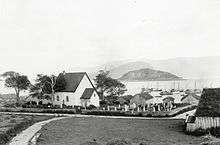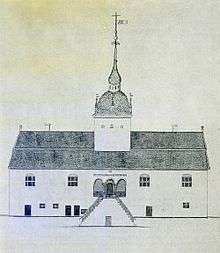Hans Holtermann
Hans Holtermann (c. 1709 – 1781), also known as Hans Henrik Holtermann or Hans Henriksen Holtermann, was a Norwegian businessman and landowner. Holtermann's grandfather is believed to have immigrated from Rothenburg, Germany to Bergen in 1673 (he acquired citizenship in 1676).[1] His first marriage was to Margaretha Knudsdatter Wiig (from Vik in Ørsta, 1692–1743). His second marriage was to Ingeborg Catharine (a.k.a. Cathrina, Cathrine) Hagerup (August 30, 1730 – 1796), the daughter of Bishop Eiler Hagerup.[2] Holtermann was the brother-in-law of the magistrate Melchior Falch, who was married to a younger daughter of Bishop Hagerup. His son, Knut Holtermann, became a supreme court judge in Copenhagen (then also the capital of Norway).[3][4]

Holtermann was a trader in Djuvik (Djup Vika) in Vegsund, Borgund.[5] His father, Henrik, had trading rights in Bergen. At that time there was no kjobstad in Sunnmøre district and the Holtermans extended their privileges to Borgund and set up a trading post at Brunholmen that eventually became the nucleus of the town of Ålesund. Hans Holtermann hosted Christian VI of Denmark on the King's famous journey through Norway in 1733.[6][7] Hans Holtermann may have introduced klippfisk production and trade to the area.[8][9]

He purchased parts of the Giske estate circa 1750, and in 1760 Austrått manor in Ørland.[10] Holtermann is believed to have paid 26,000 riksdaler for Austrått. The Austrått manor also included part or full ownership of a large number of smaller farms in the Ørland region.[11] Upon purchasing the Giske estate, Holtermann became the owner of Giske Church, and together with Hans Strøm he carried out a major restoration of the dilapidated building.[12] After the restoration, Hans Strøm had an epitaph written, including the following praise of Holtermann:[13] Sikkert var gudshuset faldt, / glemt som det var alverden, / hadde ei Holtermann faat, / den gjæve eier og værge, / reist dig til fordums magt. / Og kongen har arbeidet bifaldt. / Nu, o kirke, vil du, / frelst kunne synge Guds pris. (Certainly this house of worship fell, / Forgotten by the whole world, / A Holtermann received it, / A princely owner and guardian, / And raised thee to thy former might. / And the king approved of the work. / Now, oh Church, saved, / May you sing God's praises.)
References
- ↑ Digitalarkivet: Borgerskap i Bergen 1600–1751.
- ↑ Erlandsen, Andreas. 1855. Biographiske Efterretninger om Geistligheden i Trondhjems Stift. Christiania: Chr. Tønsbergs forlag.
- ↑ Hallager, G. (1915). Norges høiesteret 1815-1915. Oslo: Aschehoug.
- ↑ Template:Kilde bok
- ↑ Dale, Bjørn Jonson. 1995. Ørstingar—ættebok for Ørsta. Del 1 1600–1900. Ørsta: Ørsta kommune, p. 132.
- ↑ Ekroll, Knut (1918): Brunholmen i Aalesund og kongeparrets opphold der 1733. Tidsskrift for Sunnmør Historiske lag. 1916-1917. 8-9de aargang. Utgitt i Aalesund.
- ↑ Dale, Bjørn Jonson (1987): «Borgarsetet Brunholmen». I Brunholmen og Molja (red av Kjell Skorgevik), Aalesunds Museums skrift nr 16.
- ↑ Schneider, J.A. (1905): Molde og Romsdalen. En historiske oversigt. Trondhjems historiske forening/Oscar Andersens bogtrykkeri.
- ↑ Strøm, Hans (1762): Physisk og Oeconomisk Beskrivelse over Fogderiet Søndmør beliggende i Bergen Stift i Norge. Første Part. Sorøe: Trykt hos Jonas Lindgren, s.496.
- ↑ Sørensen, Terje. "Familien Hans Henriksen Holtermann". Yrjar Heimbygdslag (in Norwegian). Retrieved 2009-02-21.
- ↑ Moe, Wladimir. 1920. Norske Storgaarder. 2nd ed. Kristiania: Aschehoug.
- ↑ Giske kyrkje.
- ↑ Tennø, Karl, & Knut Ekroll. 1914. Litt om Giske kapel. Tidsskrift for Sunnmøre Historielag, vol. 6 (Aalesund).